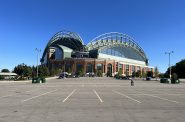The Foxconn Deal Was Never Real
The Verge interviews employees who describe nightmare-like conditions and a completely phony project.
The story is called “The Eighth Wonder of the World*” with the asterisk then spelled out: “wonder not guaranteed.”
The headline for the story by The Verge, which covers the technology industry, references the wondrous pronouncement by President Donald Trump, which was itself a hyped-up version of Republican Gov. Scott Walker‘s promise that the deal he signed with the Taiwanese company Foxconn would transform the state economy. Urban Milwaukee has done many stories documenting constant flip-flops by the company and problems with the deal and questioning whether the “LCD factory” in Mount Pleasant was actually what it claims to be.
“Even the handful of jobs the company claims to have created are less than real: many of them held by people with nothing to do, hired so the company could reach the number required for it to get tax subsidy payments from Wisconsin.”
And even that ploy failed as the Wisconsin Economic Development Corporation has repeatedly found the company didn’t come close to hiring the number of employees required under the contract, and has now told the company it can never get any tax credits until it agrees to a new contract that aligns with the company’s actual plan for development, rather than the promises it made to Walker that have never been realized. “Once Foxconn is able to provide more accurate details of the proposed project, such as its size, scope, anticipated capital investment, and job creation, WEDC would be able to offer support for the project with tax incentives,” as a letter to Foxconn from Missy Hughes, CEO of the WEDC, informed the company.
Months after the 2018 groundbreaking for the supposed factory in Mount Pleasant, The Verge’s reporter Josh Dzieza recounts, “the company was racing to hire the 260 people needed to receive the first tranche of payments from the lucrative subsidy package… Recruiters were told to hit the number but given little in the way of job descriptions. Soon, the office began to fill with people who had nothing to do. Many just sat in their cubicles watching Netflix and playing games on their phones…”
“It was just the beginning. Foxconn would spend the next two years jumping from idea to idea — fish farms, exporting ice cream, storing boats — in an increasingly surreal search for some way to generate money from a doomed project…
“The problem, employees soon learned, was that Foxconn’s planning did not extend far beyond the broad promises made to Wisconsin officials: an enormous LCD plant, some other manufacturing, lots of jobs. There appeared to be no research into the market for products Foxconn might make or the costs of producing those products in Wisconsin. Employees know this because many of them, no matter what role they had been hired for, were told to figure out what Foxconn should do in Wisconsin themselves.
“’They asked me to create a business in Wisconsin, to come up with a business model, whatever I thought would make money,’ said one of several engineers who was training in Taiwan when Foxconn called him home to help figure out what to do. He came to a conclusion shared by many who joined the project: ‘The most common misunderstanding with Foxconn is people here thought Foxconn had a strategy and a business plan when they were coming into Wisconsin. They did not. They had no plans at all.'”
Employees “searched for things in Wisconsin they could export to China: cosmetics, designer handbags, ice cream, carp.” Alan Yeung, Foxconn’s director of US strategic initiatives, asked employees “to draw up a plan for building an aquaponic fish farm in Mount Pleasant, having been inspired by a company in northern Wisconsin and reasoning that Foxconn had access to cheap water the state provided for LCD manufacturing. They briefly explored doing something with esports, maybe sponsoring a gaming team that could use the empty innovation centers, according to one source. A plan to export dairy to China got as far as a meeting with the Wisconsin Department of Agriculture before collapsing. The department confirmed it met with Foxconn representatives about the plan in the spring of 2019 but said Foxconn paused ‘to conduct more research’ and no additional discussions have taken place.”
Yeung also pushed a “Smart Cities” venture with Racine, whose Democratic Mayor Cory Mason did all he could to make happen. It would involve “camera-festooned autonomous vehicles [that] would patrol high-crime areas… guided by 5G cells mounted on lamp posts. Self-driving vehicles — retrofitted golf carts at first, then shuttles as soon as 2020 — would ferry Racine’s workers to Foxconn’s campus.”
“In March 2019, Mason and Foxconn’s Woo released a memorandum of understanding to make the vision a reality,” the story reports. “But when city officials started asking basic questions about the sort of infrastructure they needed to build in order to accommodate Foxconn’s technology, Foxconn employees found they were unable to get clear answers from the company… ‘The whole thing was a facade,’ said another employee. ‘It was an idea that Alan baked up and tried to commit the business to.'”
But Foxconn eventually said the deal was too expensive and made no sense, the employee noted, and “Poor Racine was left scratching their head and saying, ‘What just happened?'”
“Foxconn only ever got as far as buying the golf carts,” Dzieza reports, which “arrived from China disassembled, in orange, pink, and other festive colors.,, Unable to make them autonomous, Foxconn put them in storage in the multipurpose building. At one point, the company discussed outfitting them with lights and turning them into security vehicles, but the subsidiary in charge of security” refused to pay for the carts. “As the divisions bickered, bored employees would come down from the Milwaukee headquarters to race the carts around the empty building, until the batteries finally died.”
“Earlier partnerships announced with local companies like Rockwell Automation had been followed by total silence. (Employees say they quickly fizzled; Rockwell did not return a request for comment.)”
As the company scrambled to find anything it could manufacture, a Foxconn executive “flew to DC to meet with Trump trade adviser Peter Navarro, who suggested Foxconn become a vendor to the US General Services Administration… Employees searched for products Foxconn already made that were eligible for the GSA, but everything was either unprofitable or already being sold by major Foxconn customers like Dell and Cisco, according to a source with knowledge of the project, which would mean Foxconn would risk undermining actually profitable business relationships to salvage the Wisconsin project.”
To gain the tax credits from the state, Foxconn hired some 580 people at the end of 2019, with sixty percent hired in the final two months. But as Urban Milwaukee has reported, the contract has a huge loophole, allowing the company to collect the tax credits for capital investments even if the employees are then laid off. Which is exactly what happened, Dzieza reports. “The layoffs began with the new year. Starting in January, when the promised LCD factory was originally scheduled to open, Foxconn instead began letting employees go in batches…. ‘It was a pump and dump,’ said an employee.”
Many employees left good jobs to take what turned out to be fake jobs with Foxconn, the story notes, with some describing abusive treatment by their bosses.
“The state has upheld our part of the contract,” said Joel Brennan, Secretary of the state Department of Administration , in an interview with Dzieza. “Unfortunately, Foxconn hasn’t been able to do that on their side.”
That may be the understatement of the year. One former employee put it this way: “We got screwed. The state got screwed.”
If you think stories like this are important, become a member of Urban Milwaukee and help support real, independent journalism. Plus you get some cool added benefits.
More about the Foxconn Facility
- Foxconn Paid Mount Pleasant $15 Million Make-Up Fee in 2025 - Steph Conquest-Ware - Jan 6th, 2026
- Murphy’s Law: Total Cost of Foxconn Is Rising - Bruce Murphy - Dec 8th, 2025
- WEDC, Foxconn announce additional $569 million investment in Racine County - Wisconsin Economic Development Corporation - Nov 25th, 2025
- Foxconn Acquires 20 More Acres in Mount Pleasant, But For What? - Joe Schulz - Jan 7th, 2025
- Murphy’s Law: What Are Foxconn’s Employees Doing? - Bruce Murphy - Dec 17th, 2024
- With 1,114 Employees, Foxconn Earns $9 Million in Tax Credits - Joe Schulz - Dec 13th, 2024
- Mount Pleasant, Racine in Legal Battle Over Water After Foxconn Failure - Evan Casey - Sep 18th, 2024
- Biden Hails ‘Transformative’ Microsoft Project in Mount Pleasant - Sophie Bolich - May 8th, 2024
- Microsoft’s Wisconsin Data Center Now A $3.3 Billion Project - Jeramey Jannene - May 8th, 2024
- We Energies Will Spend $335 Million on Microsoft Development - Evan Casey - Mar 6th, 2024
Read more about Foxconn Facility here
Back in the News
-
Justice Ziegler Misquotes US Supreme Court Decision
 Dec 2nd, 2025 by Bruce Murphy
Dec 2nd, 2025 by Bruce Murphy
-
Will West Milwaukee Do Development Near Brewers Stadium?
 Dec 1st, 2025 by Bruce Murphy
Dec 1st, 2025 by Bruce Murphy
-
Key Streetcar Opponent Opposes Effort to Shut It Down
 Nov 10th, 2025 by Bruce Murphy
Nov 10th, 2025 by Bruce Murphy























Thanks, Bruce, for your continued interest in this never ending debacle. If Scotty tries to run for governor against Evers, or other Foxconned politicos from Robin Vos to Paul Ryan, I want these stories to be retold again and again.
Bruce, you covered total accounting quite well for the Miller Park deal (?) and many articles here along the way have touched on it, so maybe you’ve done it already, but I think we’d love to see a “current accounting” of everything paid, promised, and reinvested. No direct payments tax credits — got it — but that’s an easy one for people to duck because of the “performance based contract”, but even other “small” things like tax breaks they might’ve gotten on construction supplies due to previous legislation and others add up to some not insignificant numbers for WI taxpayers. Local roads built beyond current needs would count, but one would have to only consider a percentage of the I-94 work as it was already in progress and would’ve been finished anyway, so in one sense, the Foxconn push might’ve “saved” money there. Mount Pleasant is on the hook for quite a bit though as the articles noted, maybe there’s a path for them to be made whole.
Good luck, steenwyr, on anybody being “made whole” from this debacle. Vos and Walker and Trump bought a farm that won’t bear fruit. They bought the farm when they bought that farm.
As someone said (Twain?), it’s easier to fool people than tell them they’ve been fooled. The trail of Foxconn’s broken promises should have been a clue.